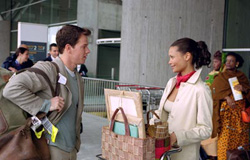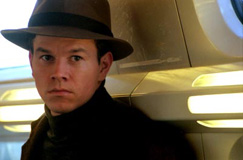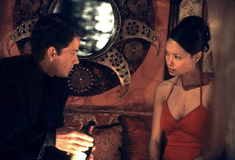The Truth About Charlie (Jonathan Demme) 2002
 Jonathan Demme’s The Truth About Charlie is a
carefree caper that remakes Stanley Donen’s 1963 Hitchcock knockoff Charade
with enough zest to make a 40-year-old premise feel completely fresh. Charade
was a solid film, anchored by disarmingly charming turns by Audrey Hepburn
and Cary Grant, but there’s no doubt that it took place in a version of Paris
that could only exist in Hollywood’s imagination. In Demme’s remake, the
setting has been updated, but still nods to the past. The new film’s
color-blind casting, occasional, casual nude scenes, preponderance of real-life Parisian
locales, and infusion of cinematic trickery (such as the use of multiple film
stocks, jump-cutting, and slow-motion) don’t pay homage to Donen’s film,
however, but instead to the early films of the French New Wave, which were made
concurrently with Charade, but did a much better job of showing what
Paris was like during the early 1960s. Several key figures from the period (Anna
Karina, Agnes Varda, Charles Aznavour) turn up as well, but the incessant references never
grow overbearing. Instead, it’s as if Demme is tipping his hat to what was
probably the most significant movement in film history and saying, “Thanks, I
couldn’t have done this without you.” The relatively frivolous nature of the
film makes the references float by and I imagine a viewer who’s never seen a
French film would have no problem ignoring them. Still, Demme’s reverent
humility here underscores the profound impact that those French filmmakers have
had on filmmaking, even in Hollywood.
Jonathan Demme’s The Truth About Charlie is a
carefree caper that remakes Stanley Donen’s 1963 Hitchcock knockoff Charade
with enough zest to make a 40-year-old premise feel completely fresh. Charade
was a solid film, anchored by disarmingly charming turns by Audrey Hepburn
and Cary Grant, but there’s no doubt that it took place in a version of Paris
that could only exist in Hollywood’s imagination. In Demme’s remake, the
setting has been updated, but still nods to the past. The new film’s
color-blind casting, occasional, casual nude scenes, preponderance of real-life Parisian
locales, and infusion of cinematic trickery (such as the use of multiple film
stocks, jump-cutting, and slow-motion) don’t pay homage to Donen’s film,
however, but instead to the early films of the French New Wave, which were made
concurrently with Charade, but did a much better job of showing what
Paris was like during the early 1960s. Several key figures from the period (Anna
Karina, Agnes Varda, Charles Aznavour) turn up as well, but the incessant references never
grow overbearing. Instead, it’s as if Demme is tipping his hat to what was
probably the most significant movement in film history and saying, “Thanks, I
couldn’t have done this without you.” The relatively frivolous nature of the
film makes the references float by and I imagine a viewer who’s never seen a
French film would have no problem ignoring them. Still, Demme’s reverent
humility here underscores the profound impact that those French filmmakers have
had on filmmaking, even in Hollywood.
 Demme’s most singular stylistic trademark is his use of
straight-on close-ups, and they flatter Newton immensely here. Her reaction
shots turn the sometimes-mundane plot developments in the spy plot into
something more intensely immediate. She has mammoth shoes to fill, filling in
for Hepburn as she is, but she’s nearly up to the task. When one of the thugs
reveals a secret crush on her, it’s almost impossible not to sympathize since
she’s so luminous. Her performance is pretty easily the best star turn to come
along thus far this year. Mark Wahlberg can’t hold a candle to Cary Grant,
however, and the less said about him the better. He doesn’t exactly fail to
come across well in his individual scenes. He’s sometimes charming for a
moment or two, but at no time does his dopey demeanor suggest his character is
capable of the sort of pretense that he’s up to. His performance unfortunately
exists almost entirely on the exterior. Still, when the two of them are
together, some sparks fly. Things as simple as the way they use each other’s
first name incessantly and the coyness about sex add a good amount of class to
their relationship, and push it toward the level of the one between Grant and
Hepburn in Charade, which The Truth About Charlie surpasses in
overall quality.
Demme’s most singular stylistic trademark is his use of
straight-on close-ups, and they flatter Newton immensely here. Her reaction
shots turn the sometimes-mundane plot developments in the spy plot into
something more intensely immediate. She has mammoth shoes to fill, filling in
for Hepburn as she is, but she’s nearly up to the task. When one of the thugs
reveals a secret crush on her, it’s almost impossible not to sympathize since
she’s so luminous. Her performance is pretty easily the best star turn to come
along thus far this year. Mark Wahlberg can’t hold a candle to Cary Grant,
however, and the less said about him the better. He doesn’t exactly fail to
come across well in his individual scenes. He’s sometimes charming for a
moment or two, but at no time does his dopey demeanor suggest his character is
capable of the sort of pretense that he’s up to. His performance unfortunately
exists almost entirely on the exterior. Still, when the two of them are
together, some sparks fly. Things as simple as the way they use each other’s
first name incessantly and the coyness about sex add a good amount of class to
their relationship, and push it toward the level of the one between Grant and
Hepburn in Charade, which The Truth About Charlie surpasses in
overall quality.
 The romantic entanglement between the lead duo was the main
attraction in Charade, and I’m tempted to say the same applies with Charlie,
but Demme expands the scope of his characters’ lust so that it seems as if
love might pop up serendipitously, anywhere at any time. A hilarious tango
sequence that begins implicating everyone in the orgy is one of the funniest
scenes of the year. In what feels almost like a parody of the American movies’
conception of Paris as the epicenter of all things romantic, everything about
the movie seems charged with a little sexual energy. The Eiffel Tower is
omnipresent, and seems to demand the characters start making nookie posthaste.
This two-way exchange between French and American pop culture and pop
perceptions of each other seems a natural extension of the films of the New
Wave, which are deeply reverent Hollywood movies, and as a result, the movie
feels full of a sense of playfulness that renders the plot somewhat moot (though
Charade was certainly playful too, with Hepburn boldly confronting her
stalkers and whatnot). Tim Robbins has a delicious, deadpan turn as a secret
agent who’s helping the heroine, but even he can’t sustain the right mood
during the obligatory climactic showdown (which feels doubly obligatory when you
consider that the audience that will get Charlie’s New Wave references
will likely have seen Charade already). Fortunately, the almost tangible
romantic mood and the wonderful soundtrack are more than enough to sustain the
viewer through Charlie’s mildly lumbering, more densely plotted sections. This
is quite clearly one of Hollywood’s top releases thus far this year.
The romantic entanglement between the lead duo was the main
attraction in Charade, and I’m tempted to say the same applies with Charlie,
but Demme expands the scope of his characters’ lust so that it seems as if
love might pop up serendipitously, anywhere at any time. A hilarious tango
sequence that begins implicating everyone in the orgy is one of the funniest
scenes of the year. In what feels almost like a parody of the American movies’
conception of Paris as the epicenter of all things romantic, everything about
the movie seems charged with a little sexual energy. The Eiffel Tower is
omnipresent, and seems to demand the characters start making nookie posthaste.
This two-way exchange between French and American pop culture and pop
perceptions of each other seems a natural extension of the films of the New
Wave, which are deeply reverent Hollywood movies, and as a result, the movie
feels full of a sense of playfulness that renders the plot somewhat moot (though
Charade was certainly playful too, with Hepburn boldly confronting her
stalkers and whatnot). Tim Robbins has a delicious, deadpan turn as a secret
agent who’s helping the heroine, but even he can’t sustain the right mood
during the obligatory climactic showdown (which feels doubly obligatory when you
consider that the audience that will get Charlie’s New Wave references
will likely have seen Charade already). Fortunately, the almost tangible
romantic mood and the wonderful soundtrack are more than enough to sustain the
viewer through Charlie’s mildly lumbering, more densely plotted sections. This
is quite clearly one of Hollywood’s top releases thus far this year.
* * * 1/2
10-24-02
Jeremy Heilman